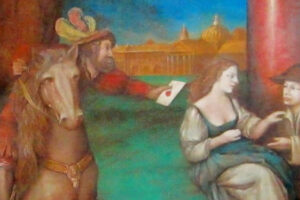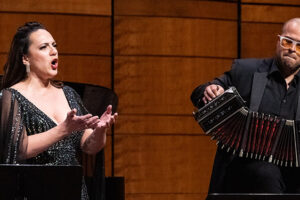

Victor Herbert, Irish born and German bred, was already the triumphant composer of such operettas as Babes in Toyland, The Red Mill, Mlle Modiste and Naughty Marietta when, in 1907, Oscar Hammerstein asked him to compose a grand opera on an American story for the Manhattan Opera Company. The company perished in 1910, but Herbert’s Natoma, sometimes dubbed the first American grand opera, was presented in Philadelphia, Chicago and New York in 1911 and, despite mediocre reviews, remained on the boards till 1914. Mary Garden took a fancy to the role of the unselfish convent-bred chief of the coastal tribes, dignified but passionate but, y’know, dignified. Significant high notes but also significant Looks and regal walks.
The title role, in Natoma’s first full performance in a hundred years Sunday afternoon by the Victor Herbert Renaissance Project at the DiMenna Center for Classical Music on West 37th Street, seems designed for a soprano with both a blazing top and full verismo chest voice, and how Garden (or anybody else) managed to sing the damn thing is a mystery—but you know her Dagger-Dance had them at seat’s edge. And for whom (if you hadn’t read the synopsis) was her dagger destined? The snarling half-breed? The faithless sailorman? For Natoma herself? For Neil Patrick Harris as a louche, audience-threatening transsexual nun? And in 1911, Mary’s original leading man was John McCormack. (Recordings of some numbers survive.)
“Lightly staged” (no sets, costumes or playing area) by Alyce Mott, this Natoma was patchily played by an enormous and enthusiastic orchestra under Gerald Steichen, after about nine hours of rehearsal. That was impressive, considering that Herbert, after years of Broadway pit orchestras, was a kid in a candy store on his foray into the big time. (He did get to do this once again, a one-acter called Madeleine for the Met.)
Natoma is full of sweeping tunes and sweeping effects, echoes of Puccini, Bizet, Sullivan, even Wagner, and plenteous pre-echoes of film scores of a later era. We are left in no doubt that the gardens of California are full and fragrant in the moonlight, that surf tumbles on the shore, that dark, brooding rhythms (ah those tribal bassoons!) lurk in the hills and in Indian bloodstreams. It’s kitschy, but the man took orchestration seriously and knew how to get his effects.
There were surprisingly few risible moments in the orchestra’s work, and there’s a certain variety. The dance sequence at the Fiesta gives us a habanera (with castanets), a minuet, a strident march (with brief hymn to the goddess Columbia) from a platoon of visiting American sailors—and then that Dagger-Dance! And did I mention Natoma’s Invocation of Great Manitou?
What Natoma lacks, as most of the new American operas lacked (at the Met, Gatti-Casazza made try after try to launch such a thing), was anything at all that did not reflect back on mid-nineteenth-century European opera, mediated through Broadway operetta. You’d never suspect Debussy or Richard Strauss existed. The new jazzy element, the black element that Gershwin and Arlen would exploit and celebrate, would not appear on the American opera stage for a very long time. There is nothing new here; just pallid imitation of the familiar.
The vocal lines proved, I believe, a further blow to Natoma’s chances to enter the repertory. The title role is just too tough for anyone but a star like Garden to put over. Lara Ryan has a radiant top and was beautiful when she was angry, but Natoma doesn’t stay angry for long. Ryan’s longer lines turned breathy and her chest voice was practically nonexistent. Singers who can manage chest voice (does anyone teach it any more?) often haven’t got silvery tops, and Ryan was taking on more than she or, I suspect, most sopranos can chew.
Monica Yunus, whom one has admired at the Met, played Barbara de la Guerra, Natoma’s great friend but rival in love (yeah, it’s that plot), with a similar sort of desperate striving for notes that were not attractive when they emerged. Their hypotenuse, Lieutenant Paul Merrill, was sung by tenor Tyson Miller, whose brilliant top was not matched by anything very attractive or audible below the staff. Gregory Sheppard sang Barbara’s clueless Spanish aristocrat father, displaying a sizable and venerable bass with an inclination to wobble.
The posse of bad guys was far more likably cast. Baritone Matthew Singer was suave and effective as Barbara’s jealous cousin, especially in a lovely Act I serenade, a typically winning Herbert melody. Robert Blalonek seethed with pretty phrases as Castro, whose half-breed status indicates that none of his emotional swings or daredevil behaviors will be predictable to the sedate white folks who attended the opera in 1911. (How there got to be so many half-breeds since, as every opera, operetta, horse opera and movie informs us, the different races never really find each other attractive is a great puzzle.) Tenor Colin Anderson sang a number about irresistible Spanish girls with a bright sound and real showman’s flare. Ron Loyd was the padre-ex-machina who turned up to save Natoma’s life and the opera’s third act with radiant dark tone.
Hearing Natoma more or less in full (they had to cut the last five bars of music fading away due to time constraints on use of the hall) gives one an idea of what an able, theatrical composer like Herbert was nonetheless up against in the grand opera sweepstakes. His use of “leitmotivs” is chic but doesn’t take us anyplace new or fulfilling. The scenic colors do not enhance the central story as they do in Butterfly, Carmen or Aida—they are the central story. The lovers may sing (or overhear) all the love duets they like, but we do not sense any depth of character or change of heart in their souls. Herbert was a natural but not for opera.























Comments